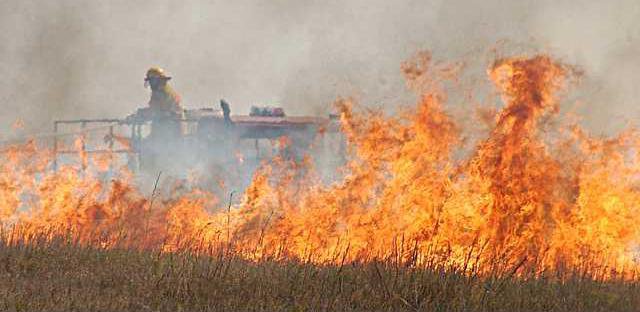About two inches of moisture.
That is how much the foot or so of snow dropped by the recent blizzards served to a drought-parched Golden Belt. “We’ll take what we can get,” said Ron Klein, supervisory conservationist for the Great Bend Natural Resources Conservation Service office.
But, “while that’s nice, its not enough to make up the lingering dry conditions,” he said. So, on Thursday, Adrian J. Polansky, state executive director of U.S. Department of Agriculture’s Farm Service Agency and Eric B. Banks, state conservationist for USDA’s NRCS in Kansas issued a joint burn advisory.
The warning covers regions hit the hardest by the drought (those designated as D1 or higher by the U.S. Drought Monitor map) which includes Barton and surrounding counties, and much of the Great Plains. The U.S. Drought Monitor can be located on the internet at droughtmonitor.unl.edu/.
Kansas landowners and operators enrolled in Conservation Reserve Program contracts with prescribed burns planned should be aware that persistent drought conditions across Kansas are creating conditions unsuitable for completing burns, Klein said. Dry soil conditions, wind speeds, low relative humidity, continued drought and current weather are all ongoing factors that are producing unsafe conditions.
“We don’t want to damage the soil,” Klein said. Scorched CRP ground and ground that might burn accidentally by a spreading fire, would be more exposed and subject to wind erosion.
These blazes could also threaten property and people.
Prescribed burning is an important component in CRP management, Klein said, adding many farmers burn their CRP ground annually. But, safety is also important.
As the drought stretches into its third year with the worsening absence of subsoil moisture, Klein said it is predicted to last through 2013. “This is what we need to prepare for.”
But, the advisory issued by the feds is not a legally binding one, he said. It just urges folks to take care.
“We just want them to come talk to us first,” he said of producers planning burns. “We look at conditions locally as well.”
Also, Environmental Quality Incentives Program and Wildlife Habitat Incentive Program Participants should contact their Local NRCS office to discuss planned prescribed burns.
For more information, call Klein at 620-792-3346.
Ag officials issue burn advisory
Lingering drought continues to plague region





